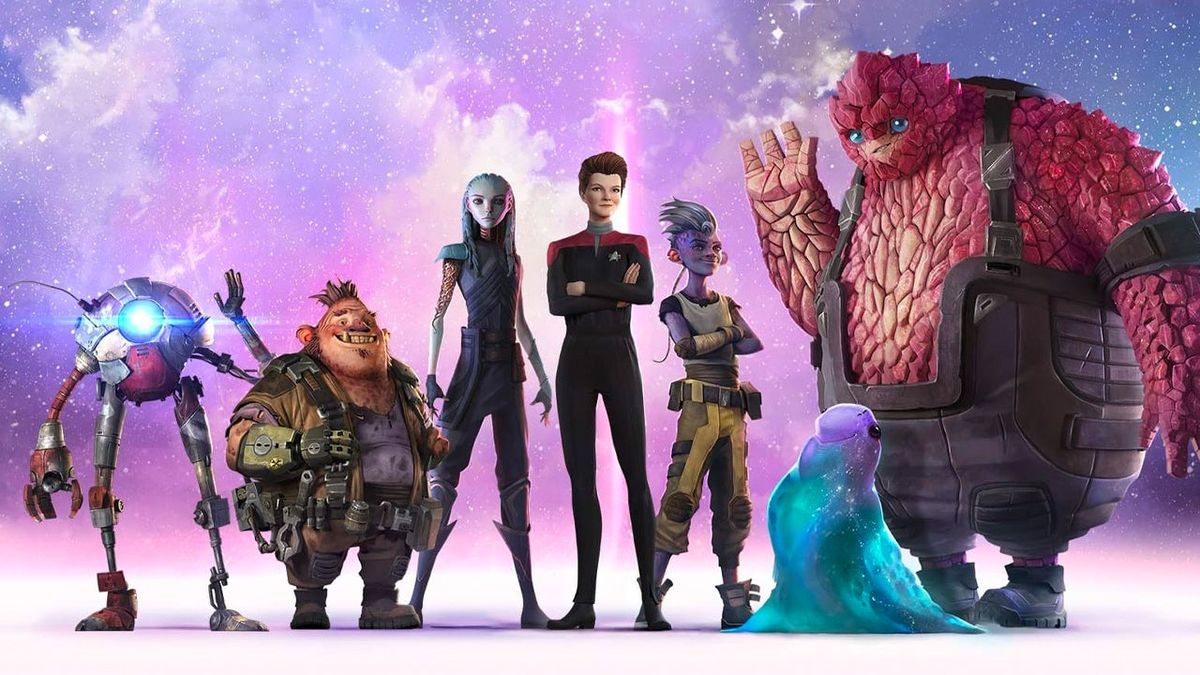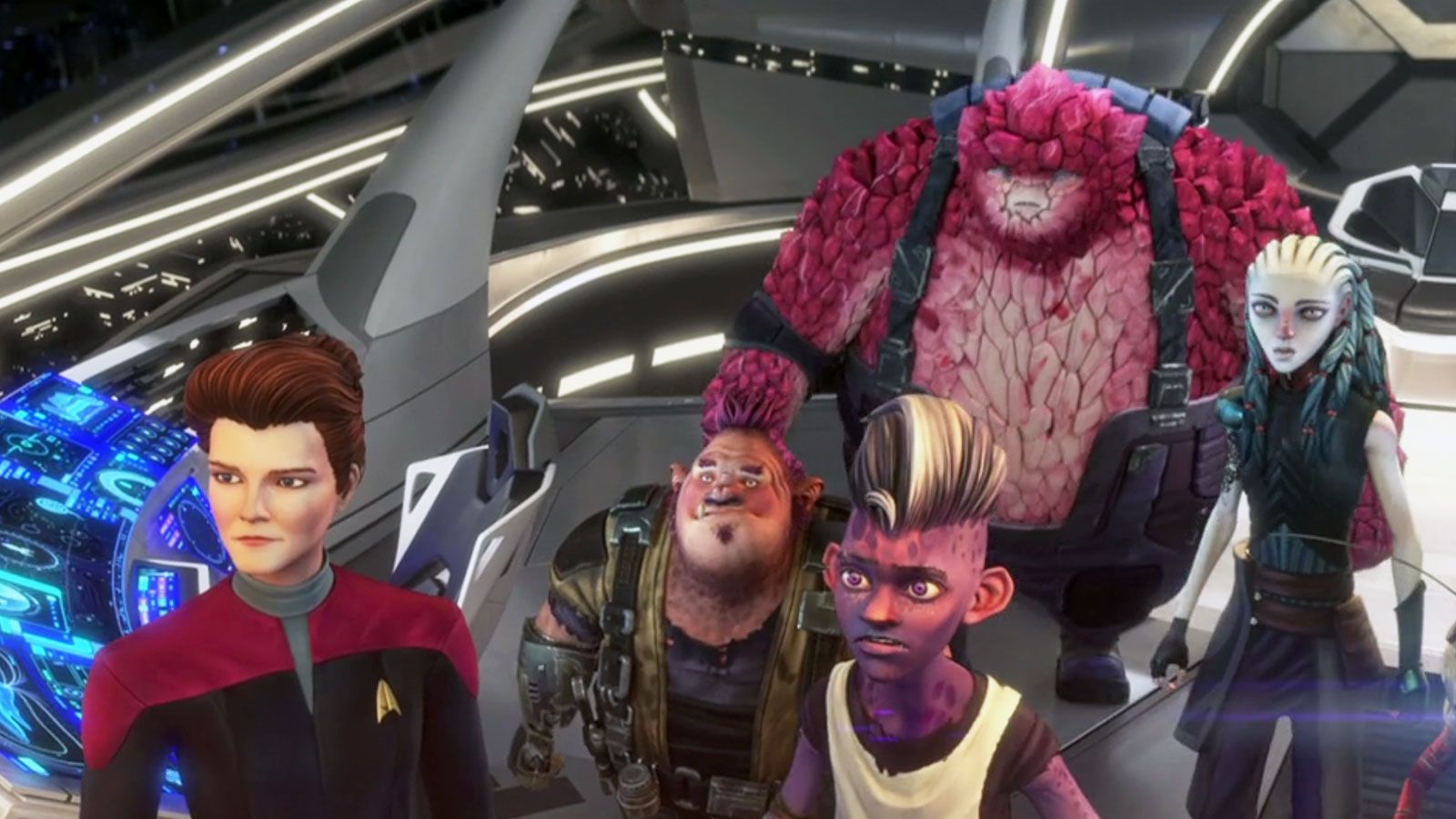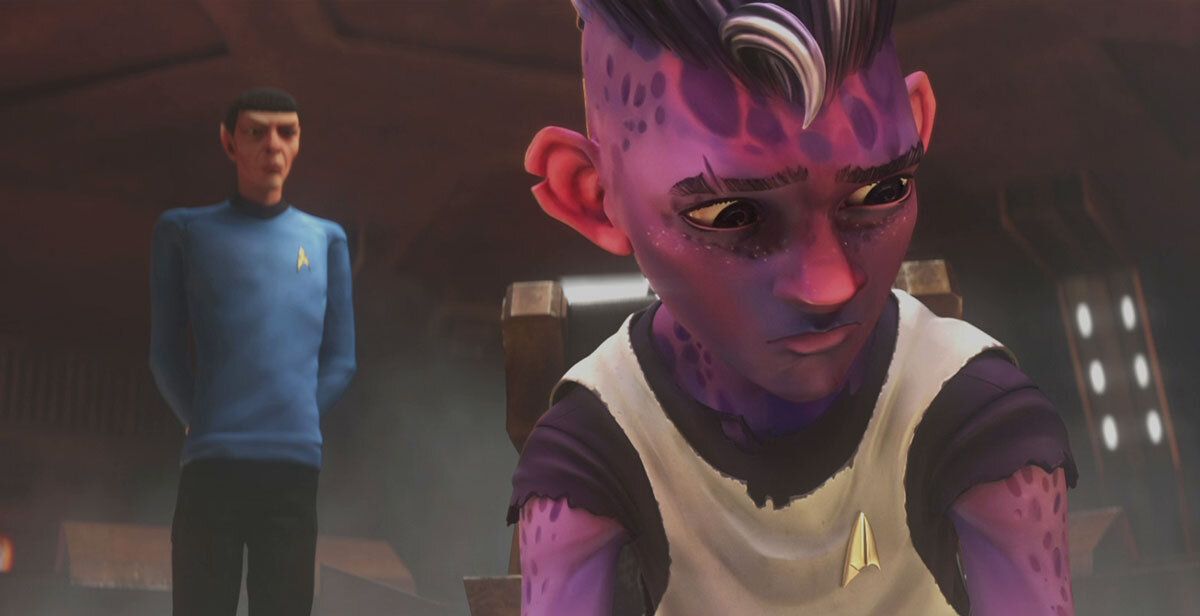Boldly Going, in Booster Seats
In which the Blu-ray release of STAR TREK: PRODIGY -- well, the first half of season one, anyway -- lets Norm indulge his inner child.

I am a middle-aged man. Between the male pattern baldness and a bout of bursitis in my knee last year, there is no denying this. And yet I found myself watching a Nickelodeon show last year, a television program explicitly aimed at children, and enjoying the hell out of it.
That sounded like a pre-emptive apology for enjoying kids’ television, so let me clarify: I know at least a dozen people who make their living writing and producing children’s TV, and they pride themselves on creating worthwhile entertainment that isn’t just brightly-colored filler between commercials. The best kids’ programming would have well-written characters, compelling conflicts and a vivid setting; why couldn’t it appeal to adults too?
Especially, y’know, if it’s a Star Trek show. And if it’s Star Trek: Prodigy, it’s just the first Trek show explicitly aimed at children since the animated series back in the ’70s. Set in the 24th century, a few years after the end of Star Trek: Voyager, Prodigy revolves around the adventures of a handful of kids in the distant Delta Quadrant – all from different species, with very different backgrounds – who stumble onto an abandoned Federation starship, the U.S.S. Protostar, and decide to take it for a spin, with a sinister overlord known as the Diviner (John Noble, of course) willing to do anything to recapture the vessel he believes is rightly his. At least they have Starfleet captain Kathryn Janeway – or at least a hologram version of same – to advise them on protocols and rules of engagement.
As showrunners and executive producers Kevin and Dan Hageman explain in one of the featurettes included on Paramount’s two-disc Blu-ray release of the first half of Season One, that was their way into a Star Trek show: They made it for kids having their first contact with the franchise, with heroes that sound and act just like them. The fact that all the leads are aliens – some of them recognizable species, others new – also serves as a justification for the animated format; realizing this concept in live-action would have been preposterously expensive, and probably less successful.
If you recall the way Andor started slowly and then snowballed into one of the most interesting deconstructions of the Star Wars property, Prodigy pulls a similar trick with Trek, beginning with a two-part episode that establishes the kids and their relationships on the mining planet where they’ve all been forced to labor for that Diviner guy – and luring us into a story very different from the organized military narratives of previous properties. There’s no Starfleet here, no chain of command; Prodigy is an outsider’s view of Trek, with heroes who stumble onto the United Federation of Planets entirely by accident and decide they’d like to embrace its ideals, however messily.
It’s very smart about what it does, and as Michael Giacchino’s title theme immediately declares, it’s downright joyful about it. The Hagemans – along with the gifted animation director Ben Hibon – use their outsider perspective to revisit a number of Trek characters and concepts, all while building out complex stories for most of their new characters.

The leader of the group is Dal (Brett Gray), who sees the Protostar as a literal vehicle to discover his own origins; Gwyndala (Ella Purnell, whom you may know as Jackie from Yellowjackets) is the Diviner’s daughter, torn between her loyalty to her father and the sense that he’s maybe not the nicest person in the universe.
Rok-Tahk (Rylee Alazraqui, an actual child) is a kind, inquisitive rock creature; Zero (Angus Imrie) is a Medusan, a being of pure energy who wears a containment suit to conceal its true form lest it drive its friends insane. There’s Jankom Pog (Jason Mantzoukas), a cranky but wildly capable Tellarite engineer. (Full disclosure: I was on board the moment as I read Mantzoukas’ name in the press release.)
And of course there’s Kate Mulgrew as Hologram Janeway – a warmer, gentler version of the character she played for seven seasons of Voyager, without the undercurrent of loneliness and desperation that show’s situation imposed. This Janeway is a teacher, encouraging her young charges to find the best versions of themselves by supporting one another as a crew, and if there’s a bit of a blind spot in the whole “surely she understands they’re actual children rather than cadets” thing … well, this is a show for kids, after all. You need a little room for kindness.
As is becoming annoyingly common these days, Prodigy was released in a split season, with a break of several months between the first ten episodes and its next ten. The season finale aired last month, and I am very happy to report the second half of the show is even better than the first, with some fun planet-of-the-week episodes – including a Galaxy Quest riff that’s an utter delight – and a satisfying conclusion to the season-long Diviner arc that sets up a really promising second season.
You can stream the entire first season right now on Crave in Canada and Paramount Plus in the US, though I’d wait for the second Blu-ray set to really enjoy the animation; the compression on Crave, at least, makes motion look a little jerky here and there, and the higher bitrate of Paramount’s Blu-rays allows for a smoother, richer presentation … even if we only get the first half of Season One.

The discs also include about an hour of supplemental material, produced with lifelong Trek viewers in mind – featurettes on where the show fits into series canon, looks at the voice casting, character and prop design, and a longer consideration of the zippy little Protostar, which incorporates elements of the Voyager design but adds a few fun little features.
I particularly appreciated the two small segments on two beloved Trek touchstones, the Prime Directive and the Kobayashi Maru, and the way the Hagemans and their writers used them for character development rather than mere nostalgia fodder … though given the use of archival audio to re-create certain key Trek characters as hologram crew members, there’s a little of that as well.
But that’s the strength of Prodigy, in the end: It’s about experiencing Star Trek through fresh eyes, finding new value in familiar surroundings and making us remember why people connect to it in the first place. Pity Discovery was already taken, huh.
In Sunday’s paid edition: My picks for the best movies of 2022. Come on, you know you want to read that. Upgrade that subscription now!
